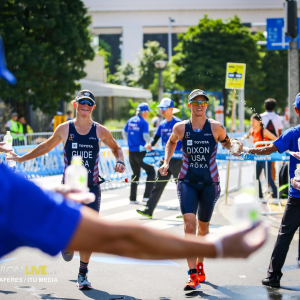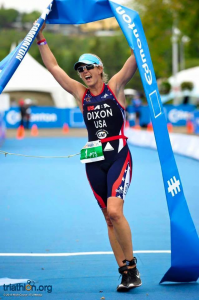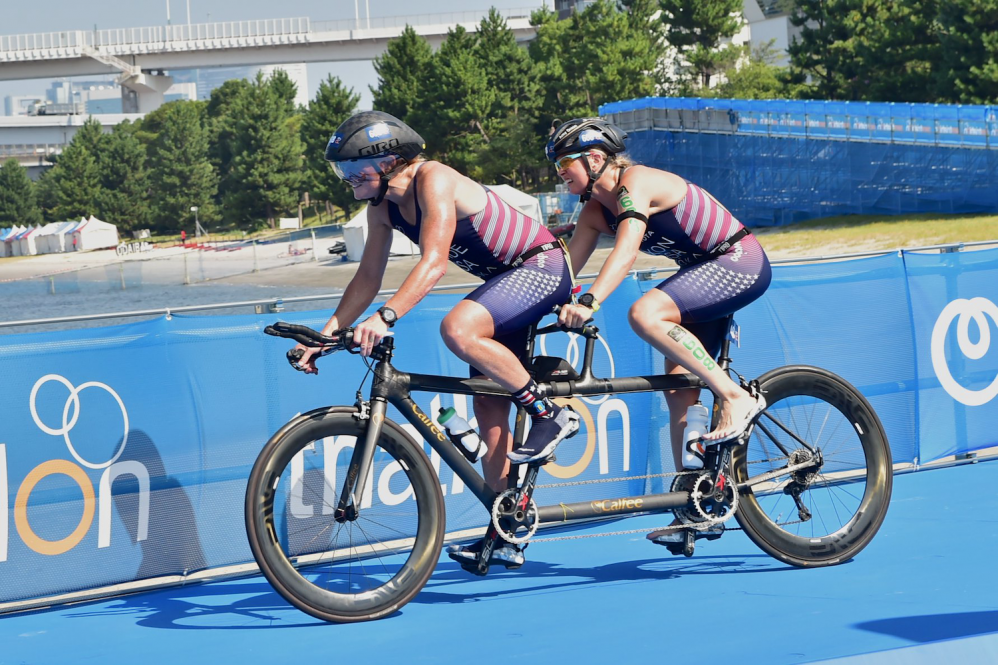Amy Dixon has always been a competitor in her life. She started to ride in equestrian events at the age of five and was swimming in meets at six. She’s played soccer and was an “all-around sports geek” in high school, as she describes it.
This summer, the former UConn student will become the ultimate competitor as a member of the United States team at the Paralympic Games in Tokyo. Dixon earned a spot in the paratriathlon, which combines a 750-meter open water swim, a 20-kilomoter bicycle race finished with a five-kilometer road race.
The Paralympic Games are scheduled to start on Tuesday, Aug. 24 and conclude on Sept. 5.

Dixon began to lose vision due to a rare autoimmune disease while in college and is now 98% blind. She competes in the paratriathlon with the assistance of her guide, Kirsten Sass.
Dixon originally grew up in Pound Ridge, New York, and had horses at her home. In her sophomore year of high school, she moved to Brookfield, and graduated from Brookfield High School.
She enrolled at UConn – taking classes at the Waterbury, Torrington, and West Hartford campuses – as a pharmacy major with a journalism minor. She was the managing editor of the student newspaper at UConn Waterbury.
Dixon started to developed sight issues as a UConn student, and at first it was night blindness. Then she was having problems pouring glasses of wine at the restaurant she was working at to help pay tuition.
“I couldn’t figure out what was going on and, unfortunately, didn’t have health insurance at the time and I put off going to a doctor,” says Dixon. “By the time I did see a doctor, it was too late to do anything about it and I had lost about 70 percent of my peripheral vision over the course of a few months. The treatment at the time was a high dosage of steroids and immunosuppression.”
At the same time, Dixon’s father passed away suddenly and she had a “crisis of faith.”
“The doctors were sure I would be completely blind within a year and made it very clear I could not be a pharmacist,” says Dixon. “I was really grateful to my UConn professors who did the best they could to help me with my lab exams and tried to do a lot of things orally as my vision was deteriorating.”
Dixon’s father had left her one of his horses, and she starting riding again while she figured she still had some vision left to do that.
She worked with advisors at UConn to find out how she could get a college degree, and eventually graduated from Post University with a degree in equine business management.
In addition to her career as an athlete, Dixon now works as a patient advocate, running a non-profit agency known as Glaucoma Eyes International.
“We started out as a small group of physicians and patients on a Facebook page about seven years ago and now we are working with over 35,000 people around the globe,” says Dixon. She speaks at pharmaceutical meetings about the disease, and trains sales and marketing teams.
“Ironically, everything has come full circle as I found a backdoor way to work in pharmacy,” she says. “I am very grateful that I’ve been able to make a career for myself in pharmacy in some sort of way.”

The Paralympic Games run from the opening ceremonies on Tuesday, Aug. 24 to the closing on Sunday, Sept. 5. The paratriathlon events will take place on Saturday and Sunday, Aug. 28 and 29.
Dixon qualified for Team USA for these Paralympics after earning an alternate spot for the 2016 games. Like many events, the Paralympics were delayed a year due to the COVID-19 pandemic. The delay has been more costly for Dixon than most, as she suffered multiple bilateral embolisms in both lungs in the past 12 months.
“I was ranked sixth in the world last year, but I got very sick during the year,” says Dixon. “We did not even think I was going to be able to compete this summer. But, we’re trending in the right direction and I have amazing coaches and teammates who have gotten me here to this point.”
The Paralympics were first held in 1960, with winter games starting in 1976. Since the 1980s, the games are now held in the Olympic-hosting city. They have grown in interest and exposure and are now televised around the world.
“People used to think it was amazing that we could bike or run, but I think they are finally realizing that it’s not just a participation event, we are serious athletes,” says Dixon, who now lives in California to train in the warm weather. “We train as hard, if not harder, than our able-bodied compatriots and teammates. We train four to six hours a day, six or seven days a week. We also have challenges to get transportation and to get to physical therapy.
“I think the general population is more aware of the challenges people with disabilities face because of the pandemic. Suddenly, everyone was stuck at home and understood the isolation that can came with having a disability, so I think there is a little more empathy out there.”
Dixon is also inspired by the large number of military veterans that are her teammates on the Paralympic team.
“The journey I have been on pales in comparison to some who have seen the unthinkable overseas while defending our country,” says Dixon. “I am very grateful to everything they’ve done to make us safe and bring honor to our country and are continuing to do so by serving in a different way with Team USA. It really inspires me to challenge my limitations and realize they are only in my head and not in my body.”
Dixon is at least the second former UConn student to earn a spot in the Paralympics, joining Steve Emt – who was a curler for the United States at the 2018 Winter Games.



